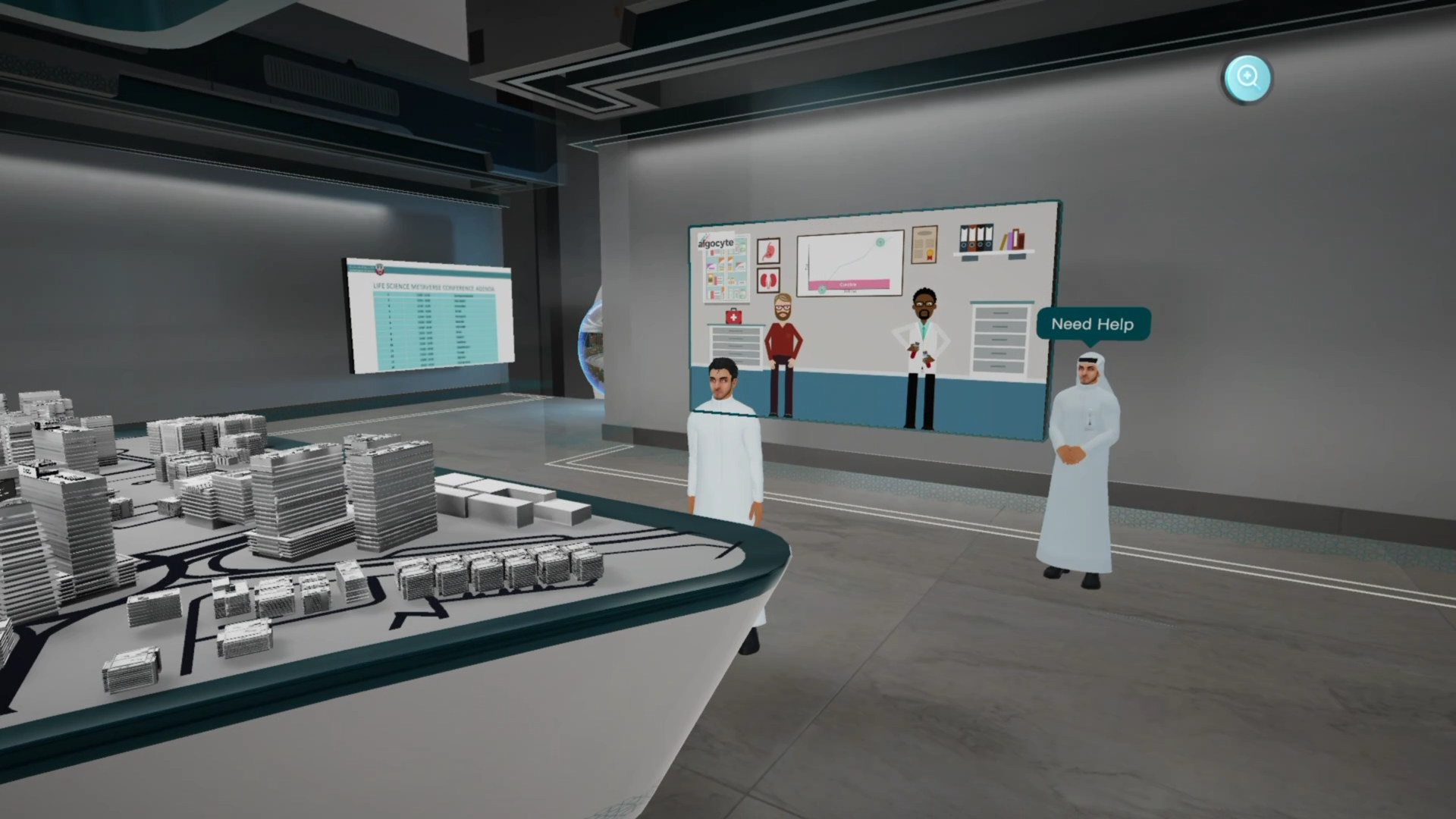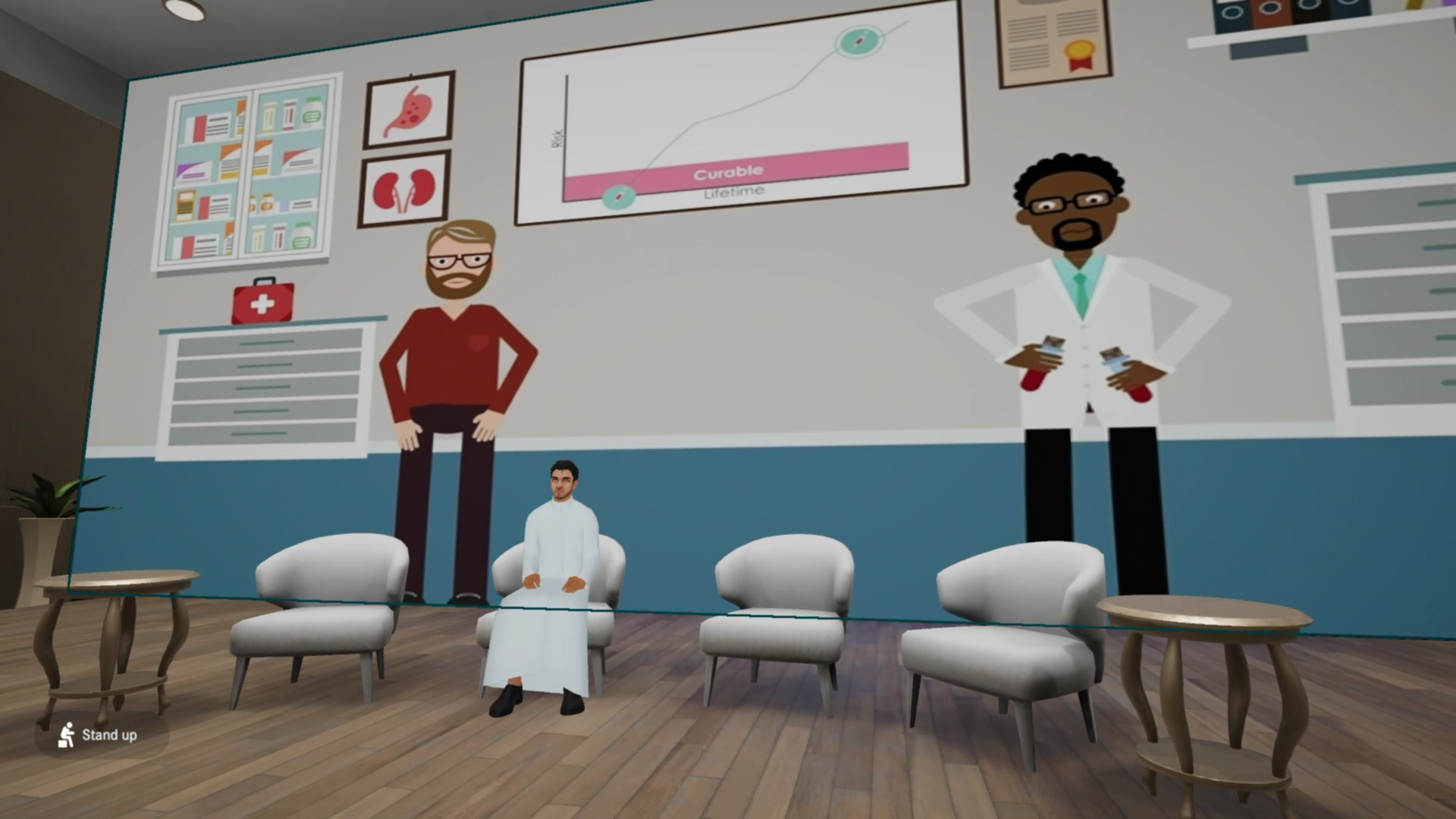Presenting Algocyte in the Metaverse at Arab Health 2024 — Second consecutive year at the global healthcare medical expo, Dubai



This week, we were delighted to participate in the first-ever “Demo Day in the Metaverse” organised by the Abu Dhabi Department of Health (DoH) as part of the Arab Health | Global Healthcare Medical Expo in Dubai 2024. This makes it the second time OIA has participated, having exhibited last year at Dubai’s Arab Health 2023. The metaverse event was part of the Abu Dhabi Department of Health’s strategy to build its presence in the Metaverse, and for us it was an opportunity to present OIA’s Algocyte, as well as meet potential partners.
OIA leadership in Europe and the Middle East
We have had a strong presence in the Middle East, having won first place in Etihad’s AI competition against giants like Microsoft, Accenture, and Etihad’s own data science team in 2021, and then in 2022 being selected by the UK Department of International Trade to represent the future of healthcare in the British Pavilion at the Expo Dubai 2020, one of only 9 start-ups so honoured. It has been inspiring to see how the U.A.E. has embraced a vision of the future of healthcare that emphasises early detection while seeking to enhance the delivery of medical treatment.
These endorsements by the U.A.E. and the U.K. give us confidence that Algocyte, created by Oxford Immune Algorithmics with the aim of eradicating disease, is regarded as a potential driver and future global player in the transformation of the current system from population-centred ‘sick care’ coverage to decentralised, precision ‘health’ care in the true sense. That is, care that keeps people healthy and thriving and out of hospitals,
OIA’s team, led by founder Dr. Hector Zenil (left), in the UAE last year for both Arab Health and the Expo 2020 in Dubai (which was postponed 2 years because of the pandemic), representing both the U.K. and the U.A.E. for two years in a row now.
The Metaverse
The Metaverse refers to a virtual world that exists as a shared immersive space for people to interact with each other and with digital objects, as well as to access digital services. In healthcare and medicine, it can afford many opportunities to keep patients at home, avoiding having to physically visit a hospital or clinic. Together with our solution, Algocyte, healthcare providers may monitor patients' vital signs remotely, reducing the need for frequent in-person visits.
The role of AI
It is clear that artificial intelligence (AI) will play a major role in this transformative effort to improve diagnostic pathways, manage the workloads of medical professionals and empower patients to take more control of their health and treatments. Ultimately, by automating the collation, analysis, and decision-making associated with vast amounts of personal data, AI can work alongside clinicians to greatly improve patient outcomes.
All of which leads to a direct discussion of AI technology itself. Right now, there is a huge debate about ChatGPT and large language models. We have seen similar hype around deep learning models as well. The problem, though, is that these technologies have often been revealed to have flaws because they are dependent on the data being inputted into them, and ultimately, on the humans who build these technologies.
AI in Medicine
Deep learning is a great statistical method for dealing with large combinatorial variance in data that always comes up with an answer and does not crash, even if it may provide the wrong answer. But it is not equipped or has found it very difficult to drive innovation in more critical areas of human activity, like scientific discovery and making seminal contributions to the scientific literature. In the interests of accountability, clinicians and patients must have absolute confidence in the AI decision-making pathway, and this requires a level of transparency currently lacking in statistical machine-learning approaches.
Furthermore, any approach to AI must reflect the complexity of human biology. People end up with particular conditions because of a multiplicity of factors, and the AI must consider all of these data points when making its recommendations. This is why we have focused our research on a systems-based approach to mechanistic model generation and causal deconvolution in medicine.
Mechanistic means that, in principle, a clinician may be able to understand the process step-by-step if they wanted to inspect it or, more importantly, to partner with the AI to take the best decision, which is unlike what most black-box deep learning approaches do today, failing to provide medical insight beyond mostly simple classification tasks. Causal deconvolution means that we aim at getting at the root causes of disease rather than remaining at the shallow level of broad statistical approaches that offer little understanding.
A vision of the future
The role of the clinician in the diagnostic pathway is currently critical both for checks and balances and also for the patient relationship. The AI may give the clinician more confidence in his or her decision, but the patient wants to be reassured that the healthcare professional is there to guide them through the process. And for patients, arming them with more information can be daunting. We’ve already seen the added stress and anxiety that “Google Doc” causes when patients search for the causes of their symptoms online. If we are to empower patients using AI we have to make sure they do not feel alone in managing their conditions.
These, and others, are important questions that must be addressed, but fundamentally, as we saw when we participated in the Demo Day, there is a real appetite for change. If harnessed properly AI can speed up decision-making, reducing backlogs. Being able to process more data sets about a patient, it can lead to more accurate diagnoses. Automating some tests and interactions can enable more patients, particularly those who are vulnerable, to remain at home and avoid the stress of travelling to and from the hospital. It can also manage clinical workloads, automating mundane business and freeing up medical professionals for more important diagnostic tasks.
The next five years are going to see a significant transformation of healthcare services. Technology will play a crucial role in that transformation. We must be careful not to overhype the capabilities of AI, but if regulators, patient bodies, and clinicians work together with technologists, there is a real opportunity to make the latest treatments more accessible, benefiting everyone in society. That is why the example of the Department of Health in Abu Dhabi is an excellent example of how governments can create environments where all of the key stakeholders can come together to find solutions to these challenges. Collaboration is key, and integrating the Metaverse into a broader strategy to identify the best path forward will have a really positive impact on the future of healthcare.
About Oxford Immune Algorithmics and Algocyte
Incubated by the University of Oxford, OIA is a deep-tech start-up that aims to apply super-human-like Artificial General Intelligence (AGI) to tackle disease and to deliver decentralised, precise, and personalised medicine to everyone.
Algocyte is Oxford Immune Algorithmics’s (OIA) flagship product, a cutting-edge technology solution created by top researchers and clinicians for healthcare professionals and health consumers to help individuals live longer and healthier lives.
Expo 2020 Dubai, January 2023. OIA was one of only 9 startups selected to represent the UK and the future of healthcare at the Expo 2020 in Dubai.
Dubai, January 2024. The OIA team produced this video showing the way from the WTC, where Arab Health takes place, to Dubai’s financial centre.


